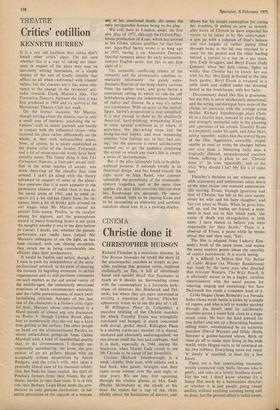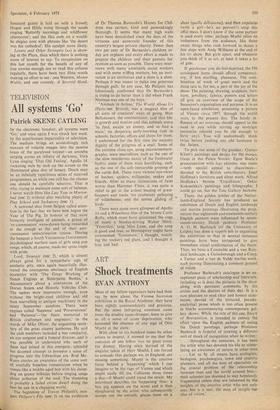CINEMA
Christie done-it
CHRISTOPHER HUDSON
Richard Fleischer is a moralistic director. In The Boston Strangler he retold the story of the psychopathic murders as simply as pos- sible, realising that genuine crime, explored realistically on film, is full of relentlessly banal and squalid detail that fascinates as much as it shocks us. Surrounding crime with the commonplace is a favourite tech- nique of directors like Hitchcock and Pol- anski, but where they are more interested in exciting a sensation of horror, Fleischer apparently wants us to see the pity of it all.
10 Rillington Place (x, Columbia), a macabre retelling of the Christie murders for which Timothy Evans was wrongfully convicted and hanged, is much concerned with trivial, pitiful detail. Rillington Place is a shabby cul-de-sac; number 10 is dismal, cluttered and absolutely undistinguished; we can almost smell the lino'and cabbages. And it is dark, especially in 1944, during the black-out, when Muriel Eady comes to see Mr Christie to be cured of her bronchitis.
Christie (Richard Attenborough) is a weak, chubby little man, with asthma and a bad back, who gasses, strangles and then rapes seven women over the next eight or nine years. We see him first squinting through his rimless glasses at Mrs Eady (Phyllis McMahon) as she stands at his door. He makes her a cup of tea, chats affably about the limitations of doctors, and shows her his simple contraption for curing her troubles. It strikes us now as remark- ably naive of Christie to have expected his victim to be taken in by this contrivance: a jam jar with a solution of friar's balsam and two lengths of rubber piping fitted through holes in the lid, one attached to a mask for the patient and the other leading behind a curtain to a tap on a gas main. Mrs Eady struggles, and Beryl Evans (Judy Geeson), when her turn comes, fights so wildly that Christie has to• knock her out with his fist. Mrs Eady is buried in the tiny back garden; Beryl Evans is wrapped in a table cloth and stuffed under the draining board in the wash-house, with her baby. Documentary detail like this is gruesome, but the film is never deliberately sensational,• and the acting and dialogue have none of the clichés we associate with ' the average crime thriller. Richard Attenborough plays Chris- tie as a fearful man, worried by small things, and strangely masterful only in the planning and operation of his crimes. Timothy Evans is completely under his spell, and John Hurt, acting superbly, makes him the central figure of the film. Aggressive, cowardly, stupid, unable to read or write, he changes before our eyes from a blustering bully into a tragically cheated, misunderstood creature whose suffering is plain to see. 'Christie done it!' he cries repeatedly; and at the trial, 'Why should I lie? My life is at stake here.'
Fleischer's decision to use whenever pos- sible statements and testimonies taken down at the time makes one moment unintention- ally moving. Evans, through ignorance and fear of Christie, has left in his care succes- sively his wife and his baby daughter, and has run away to Wales. When he gives him- self up, and the bodies are found, a state- ment is read out to him which ends, 'the cause of death was strangulation in both vases. I have reason to believe you were responsible for their deaths.' There is a close-up of Evans, a pause while he thinks about this and then says, 'Yes'.
The film is adapted from Ludovic Ken- nedy's book of the same name, and makes the same implicit points about the morality of capital punishment. It is worth seeing.
It is difficult to believe that The Ballad of Cable Hogue (AA Warner Rendezvous) was made by the same man who directed that first-rate Western, The Wild Bunch. It is obviously meant to be a happy, carefree entertainment with the usual pauses for whoring, singing and moralising; but Sam Peckinpah has made a complete hash of it. Cable Hogue (Jason Robards) is a Nevada hobo whose water-bottle is stolen by a couple of rogues, and who is left to wander parched through the desert until he accidentally stumbles across a water hole, close to a stage- coach route. He buys the land around for two dollars and sets up a flourishing business selling water, accompanied by an eccentric preacher (David Warner) and Hildy (Stella Stevens) a golden-hearted whore. Both of these go off to make their living in the wide world, while Hogue waits to be revenged on his two robbers. Everything turns out sweet 'n' dandy 'n' reunited, at least for a few hours.
There are a few entertaining moments, mostly connected with Stella Stevens who is pretty, and talks in a lovely Southern drawl.
For the rest, I don't know whether it's a funny film made by a humourless director, or whether it is just people going round smiling without anything amusing being said or done, but the general effect is sickly sweet. Innocent gaiety is laid on with a *trowel; Hogue and Hildy romp through the sands singing 'Butterfly mornings and wildflower afternoons'; and the film ends on a would- be elegiac note with phrases like 'the desert was his cathedral'. His sandpit more likely.
Lovers and Other Strangers (AA) is show- ing at the Plaza, than which there is nothing more of interest to say. To recapitulate on this last month for the benefit of any of you unwise enough not to read this column regularly, there have been two films worth making an effort to see : one Western, Monte Walsh, and one comedy, A Severed Head.



































 Previous page
Previous page